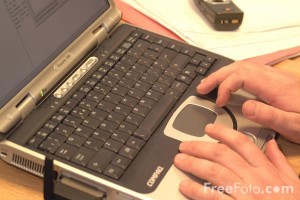Is a Laptop-Free Zone the Answer to the Laptop Debate?
 One of the most charged debates within law faculties across the country is the issue of implementing (or not) a ban on laptops in the classroom. Most law schools have wireless Internet access in the building, and some schools even require students to own laptops. More recently, however, individual law school professors (and, in at least one case, the law school itself) have begun banning the use of laptops in the classroom. The impetus for such bans seems to be professors’ concerns with students surfing the Internet during class, checking their email and instant messages, and even instant messaging their classmates “the answers” during class. Some professors feel the laptops create a physical barrier between them and their classes, and they are unable to gauge the students’ understanding of the material.
One of the most charged debates within law faculties across the country is the issue of implementing (or not) a ban on laptops in the classroom. Most law schools have wireless Internet access in the building, and some schools even require students to own laptops. More recently, however, individual law school professors (and, in at least one case, the law school itself) have begun banning the use of laptops in the classroom. The impetus for such bans seems to be professors’ concerns with students surfing the Internet during class, checking their email and instant messages, and even instant messaging their classmates “the answers” during class. Some professors feel the laptops create a physical barrier between them and their classes, and they are unable to gauge the students’ understanding of the material.
Professor Jana R. McCreary of Florida Coastal School of Law enters the debate with an article that will be published this spring in the Valparaiso University Law Review. Professor McCreary’s article contributes to the debate some empirical research on students’ laptop use. She surveyed almost 450 second-year law students from three law schools (University of Memphis Cecil C. Humphreys School of Law, Nova Southeastern Shepard Broad Law Center, and Seattle University School of Law), asking students to respond anonymously to questions about their laptop use in class and their opinions about laptop bans. Her conclusion: many students use laptops as a tool for note-taking, organizing, and, indeed, thinking; thus, an all-out ban would be detrimental to students’ learning. Her solutions: create a laptop-free zone in the front of the class and/or implement a temporary one- or two-week ban on laptops to allow students to experience class without the laptop and to decide on their own whether to continue to use a laptop.
